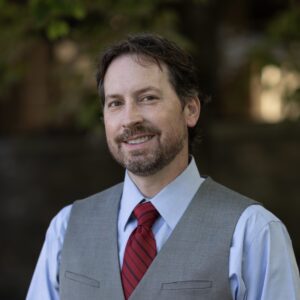Words matter. They have since the beginning. The biblical narrative in Genesis tells us that God spoke all that is into existence. His intentions in creating humankind are expressed in the words, “Let us make man in our image, after our likeness” (1:26). With words, he forms men and women who alone bear his image and likeness, who in turn communicate using words. They name animals and build culture using words. Language is one of those elements that separates humanity from the rest of creation. We give meaning to our thoughts, ideas, and sentiments through the use of a formalized system of symbols of letters and words.
Language is also dynamic and subject to human creativity. In fact, it is worth noting that language (and the ideas and sensibilities it conveys) is the product of culture while at the same time shaping the very culture from which it is derived. Words have social force. Sadly, this is what lends to the weaponization of language. Control the language and you control ideas. Eradicate or vilify words and you eradicate or vilify ideas. Change the meanings of words and you change the way we understand ideas. Because language is inextricably tied to thought, it is also inextricably tied to values, ethics, and morality. Consider the current cultural and social efforts to eradicate, redefine, or even vilify the use of words like “mother” or “woman.” These are not benign semantic shifts produced in a vacuum. They are manifestations of shifting cultural sensibilities as well as agents utilized to facilitate cultural change regarding the ways in which we think about motherhood and womanhood. Such changes have consequences. So, it seems reasonable that language, words and meanings, should be approached thoughtfully.
“Conservatism”, along with all its forms, is one such word over which there is a conflict of meaning and understanding. What does it mean individually or institutionally to be conservative? Presently, the term is sometimes used pejoratively to discredit or as a shibboleth for the purposes of association or distinction. It carries both negative and positive connotations depending upon the perspectives and attitudes through which it is viewed or understood. But the term is more robust than current usages allow. It has been given much thought over centuries, and it rests upon principles that exceed mere cultural or political identity. Russell Kirk, noted American historian, social critic, and author, was a significant thought leader of the twentieth century conservative movement. In 1953, he wrote The Conservative Mind. He considered the work an extended essay in definition, gathering the thoughts and writings from numerous conservative thinkers in Anglo-American history such as Edmund Burke (“The only thing necessary for the triumph of evil is that good men do nothing.”) and John Adams (second president of the United States). Kirk posited that conservatism is not an ideology built upon dogmas but is instead one that operates according to guiding principles. These serve as the foundational ideas of what we might call “principled” conservatism and possess significant implications for how our lives and society are ordered. Kirk also argues that radicalism since 1790 has attacked the guiding principles of conservatism on the basis of its own assumptions. Considering this collection of ideas may actually strengthen our appreciation and understanding of conservatism; provide a basis from which to judge it; and offer some perspective on the social, cultural, and political tensions we are presently navigating.
Kirk identified firstly that “a belief in a transcendent order, or body of natural law, which rules society, as well as conscience” is an essential element of what it means to be conservative. The very notion of acknowledging and submitting to a higher authority argues against the supremacy of any human being or humanity itself. This idea is inherently biblical. There is a way in which life is to be ordered, an external standard not of our own making against which our lives and actions are measured. It is not up to us to decide what is right and wrong. There is a transcendent basis for ethics, morality, and justice. Kirk argues that, conversely, radicalism holds to “the perfectibility of man and the illimitable progress of society.” He writes, “Radicals believe that education, positive legislation, and alteration of environment can produce men like gods; they deny that humanity has a natural proclivity toward violence and sin.” These are two very different paradigms, two different worldviews. Conservatism holds to a view of human nature that necessitates belief in something higher than humanity itself. From this first principle, the rest spring forth; and to it, they answer.
Secondly, Kirk noted that conservatism asserts an “affection for the proliferating variety and mystery of human existence, as opposed to the narrowing uniformity, egalitarian, and utilitarian aims of most radical systems. Enjoyment in life derives from the belief that life is worth living and that freedom reasonably and responsibly exercised is essential to that life.” Principled conservatism is not a stodgy killjoy but rather a proponent of culture, creativity, and human expression.
However, this is an ordered liberty, not an unrestrained free-for-all of individual or collective indulgence; it is an experience aligned with the first principle. These principles are intertwined and interdependent, not isolated axioms.
Kirk also posited that conservatism is guided by a principle or conviction that “civilized society requires orders and classes as against the notion of a ‘classless society.’” This is perhaps one of the more controversial principles he presents because it appears to undermine equality or worse, promote inequality. In a time when there is so much tension around ideas of equity and equality, equal opportunity and equal outcomes, it is understandable that this is a potentially volatile principle. However, Kirk also makes clear that there is “ultimate equality in the judgment of God, and equality before the courts of law.” The “political leveling” espoused by radicalism as Kirk notes is an approach in which “order and privilege are condemned; total democracy, as direct as practicable, is the professed radical ideal.” This leads to a very different and perhaps unrealistic view of society. Conservatism’s acceptance that there are inequalities of conditions is an acceptance of reality. People are not equally gifted intellectually, physically, or emotionally. Simply consider sports, music, literature, or public speaking, and it is plain enough that ability is not equally distributed. There is an inherent inequality in nature. But in true principled conservatism, the implications of that natural inequality are checked by and subject to the first principle of a higher authority and a moral standard. The equal value, worth, and dignity of every human being in the eyes of God and before all courts of law is something that should be fervently argued for, fought for, and guarded. Self-identified conservatives who do not see it this way are not aligned with these guiding principles.
Another principle that Kirk presents is that conservatism is of the “persuasion that freedom and property are closely linked.” The current cultural assault on capitalism and wealth seems fueled by the principle of radicalism, which Kirk noted as “economic leveling.” He writes, “The ancient rights of property, especially property in land, are suspect to almost all radicals; and collectivistic reformers hack at the institutions of private property root and branch.” This present assault has also cast aspersions on conservatism (and conservatives) for being materialistic and given to greed and avarice. Again, self-identifying conservatives who might be given to those sins are out of alignment with principled conservatism. In the first place, principled conservatism is not consumerism that feeds individual appetites. Rather, it sees the profound linkage between private property and freedom and holds a high view of both. This principle leads to frugality, stewardship, and respect for the property of others. It is striking that this principle held outside the context of the first principle cannot be fully understood or appreciated. The idea of higher moral authority according to which life is to be ordered demands a sense of justice and greater good, a virtuous economy. This appreciation for private property is not without founding in a biblical understanding of life and the world. God gave two commandments protecting property, which says something about the Almighty’s view of it. The Ten Commandments prohibit stealing and coveting. God also demands charity and benevolence. But there is no means of either if there is no individual ownership of property, only dependence upon the collective or state to give what it is disposed to give and no more. The linkage between property and freedom in principled conservatism is not a justification for self-indulgence but an essential to human thriving. In a day when socialism seems to be the presumed remedy for what ails us socially and economically, this is well worth considering.
The fifth of Kirk’s principles builds upon the previous ones and requires the final one. He asserts conservatism is guided by the idea that “custom, convention, and old prescription are checks both upon men’s anarchic impulse and upon the innovator’s lust for power.” This axiom of principled conservatism stands in stark contrast to radicalism which, as Kirk points out, possesses “contempt for tradition.” He continues: “Reason, impulse, and materialistic determinism are severally preferred as guides to social welfare, trustier than the wisdom of our ancestors. Formal religion is rejected for various ideologies as substitutes.” Conversely, principled conservatism values tradition, time-tested ideas, and institutions not for their own sake but rather because they protect us from ourselves. Too often when we hear about the need to tear down the old, there is no discussion about how or with what it will be replaced. It is not that old ways cannot be challenged or even undone. It is that they should be respected by not being challenged or undone lightly. This is not “respect” of a shallow emotional nature bestowed because something is liked or preferred. It is “respect” in the truest form of that word: an appreciation for the strength, value, and contribution of something (or someone).
This principle is closely related to Kirk’s sixth axiom that underscores conservatism’s “recognition that change may not be salutary reform: hasty intervention may be a devouring conflagration rather than a torch for progress.” Progress must be weighed by prudence. This might well be the essence of the present tensions between social, cultural, and political conservatives and progressives. The present culture seems to have embraced the idea that all change is progress, that every custom, tradition, convention, or institution that exists is inherently dangerous and harmful simply because it exists. Therefore, if it can be pulled apart or pulled down, it should be in order to take another step forward. But this is at its core antithetical to principled conservatism. Principled conservatism argues that just because we can do something does not mean we should, that progress as a cultural ideal is dangerous, and that there are potentially infinitely more ways to make something worse than to make it better. Wisdom must be applied, because there is much at stake beyond mere political or social power. What is at stake is the greater moral and ethical good that is in alignment with the first principle, as well as true justice in alignment with the same, and the freedom to live a life worth living.
These are not ideas without consequence. These are not words whose meanings and impact should be trifled with flippantly and tossed about to either vilify or validate an individual or institution. When institutions such as Cairn University refer to themselves as theologically or culturally conservative, it is not an issue of identification, politicization, or partisanship. The ideas expressed in the principles outlined by Kirk beg for people and institutions who are themselves guided by principles, who have the courage of conviction and a profound sense of purpose to serve the greater good. A clear and more robust understanding of what is meant by “conservative” may give us some needed perspective. The words we use and how we think about them matter greatly.
Dr. Todd J. Williams has been the president of Cairn University since January 2008. He served on the faculty and administration from 1996 to 2001, and then returned as provost in 2005. He can be reached by emailing [email protected].




